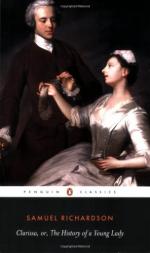* Eccles. xxv. 19.
A bad education was the preparative, it must be confessed; and for this Sally Martin had reason to thank her parents; as they had reason to thank themselves for what followed: but, had she not met with a Lovelace, she had avoided a Sinclair; and might have gone on at the common rate of wives so educated, and been the mother of children turned out to take their chance in the world, as she was; so many lumps of soft wax, fit to take any impression that the first accidents gave them; neither happy, nor making happy; every thing but useful, and well off, if not extremely miserable.
Polly Horton was the daughter of a gentlewoman, well descended; whose husband, a man of family and of honour, was a Captain in the Guards.
He died when Polly was about nine years of age, leaving her to the care of her mother, a lively young lady of about twenty-six; with a genteel provision for both.
Her mother was extremely fond of her Polly; but had it not in herself to manifest the true, the genuine fondness of a parent, by a strict and guarded education; dressing out, and visiting, and being visited by the gay of her own sex, and casting her eye abroad, as one very ready to try her fortune again in the married state.
This induced those airs, and a love to those diversions, which make a young widow, of so lively a turn, the unfittest tutoress in the world, even to her own daughter.
Mrs. Horton herself having had an early turn to music, and that sort of reading which is but an earlier debauchery for young minds, preparative to the grosser at riper years; to wit, romances and novels, songs and plays, and those without distinction, moral or immoral, she indulged her daughter in the same taste; and at those hours, when they could not take part in the more active and lively amusements and kill-times, as some call them, used to employ Miss to read to her, happy enough, in her own imagination, that while she was diverting her own ears, and sometimes, as the piece was, corrupting her own heart, and her child’s too, she was teaching Miss to read, and improve her mind; for it was the boast of every tea-table half-hour, That Miss Horton, in propriety, accent, and emphasis, surpassed all the young ladies her age; and, at other times, complimenting the pleased mother—Bless me, Madam, with what a surprising grace Miss Horton reads!—she enters into the very spirit of her subject —this she could have from nobody but you! An intended praise; but, as the subjects were, would have been a severe satire in the mouth of an enemy!—While the fond, the inconsiderate mother, with a delighted air, would cry, Why, I cannot but say, Miss Horton does credit to her tutoress! And then a Come hither, my best Love! and, with a kiss of approbation, What a pleasure to your dear papa, had he lived to see your improvements, my Charmer! Concluding with a sigh of satisfaction, her eyes turning round




